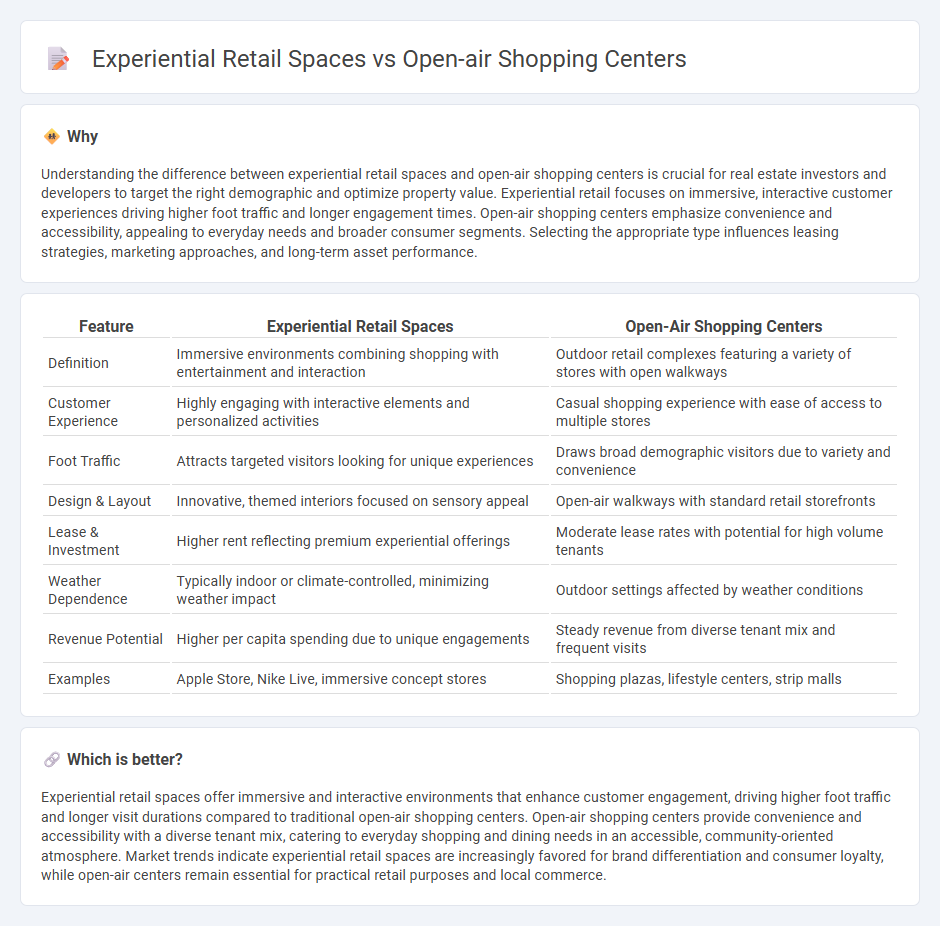
Experiential retail spaces emphasize immersive customer interactions through unique events, interactive displays, and branded experiences, driving higher engagement and longer visits. Open-air shopping centers offer a blend of retail, dining, and entertainment in an accessible outdoor environment, appealing to diverse demographics with ease of navigation and vibrant community spaces. Explore how these real estate trends transform consumer behavior and retail investment opportunities.
Why it is important
Understanding the difference between experiential retail spaces and open-air shopping centers is crucial for real estate investors and developers to target the right demographic and optimize property value. Experiential retail focuses on immersive, interactive customer experiences driving higher foot traffic and longer engagement times. Open-air shopping centers emphasize convenience and accessibility, appealing to everyday needs and broader consumer segments. Selecting the appropriate type influences leasing strategies, marketing approaches, and long-term asset performance.
Comparison Table
| Feature | Experiential Retail Spaces | Open-Air Shopping Centers |
|---|---|---|
| Definition | Immersive environments combining shopping with entertainment and interaction | Outdoor retail complexes featuring a variety of stores with open walkways |
| Customer Experience | Highly engaging with interactive elements and personalized activities | Casual shopping experience with ease of access to multiple stores |
| Foot Traffic | Attracts targeted visitors looking for unique experiences | Draws broad demographic visitors due to variety and convenience |
| Design & Layout | Innovative, themed interiors focused on sensory appeal | Open-air walkways with standard retail storefronts |
| Lease & Investment | Higher rent reflecting premium experiential offerings | Moderate lease rates with potential for high volume tenants |
| Weather Dependence | Typically indoor or climate-controlled, minimizing weather impact | Outdoor settings affected by weather conditions |
| Revenue Potential | Higher per capita spending due to unique engagements | Steady revenue from diverse tenant mix and frequent visits |
| Examples | Apple Store, Nike Live, immersive concept stores | Shopping plazas, lifestyle centers, strip malls |
Which is better?
Experiential retail spaces offer immersive and interactive environments that enhance customer engagement, driving higher foot traffic and longer visit durations compared to traditional open-air shopping centers. Open-air shopping centers provide convenience and accessibility with a diverse tenant mix, catering to everyday shopping and dining needs in an accessible, community-oriented atmosphere. Market trends indicate experiential retail spaces are increasingly favored for brand differentiation and consumer loyalty, while open-air centers remain essential for practical retail purposes and local commerce.
Connection
Experiential retail spaces and open-air shopping centers are closely connected through their emphasis on creating engaging, sensory-rich environments that attract and retain consumers. Open-air shopping centers provide the physical setting that enables experiential retail by incorporating elements such as outdoor seating, live entertainment, and interactive installations. This integration enhances customer dwell time and drives higher foot traffic, ultimately boosting sales and brand loyalty in the real estate retail sector.
Key Terms
Tenant Mix
Open-air shopping centers typically feature a diverse tenant mix anchored by essential services, dining, and national retail chains designed to drive steady foot traffic throughout the day. Experiential retail spaces prioritize unique, immersive brand experiences and entertainment-focused tenants to create engaging environments that encourage longer visits and social interaction. Explore how strategic tenant selection in these retail formats impacts consumer behavior and retail success.
Foot Traffic
Open-air shopping centers typically attract consistent foot traffic due to convenient parking and a variety of retail options, enhancing consumer accessibility and dwell time. Experiential retail spaces drive increased engagement through interactive activities and unique brand experiences, often resulting in stronger customer loyalty and longer visits. Explore the benefits of these retail formats to understand which best maximizes foot traffic for your business.
Anchoring Strategy
Open-air shopping centers leverage anchor tenants such as major retail brands or grocery stores to drive consistent foot traffic and enhance shopper convenience. Experiential retail spaces prioritize unique attractions or interactive experiences as anchors, aiming to increase dwell time and customer engagement through immersive environments. Discover how anchoring strategies can transform retail dynamics by exploring their impact on consumer behavior and mall profitability.
Source and External Links
What is an Open-Air in Retail: Shopping Center - This webpage explains the concept of open-air shopping centers, their pros and cons, and factors contributing to their success.
How to Navigate a Changing Retail Landscape: Investing in Open-Air Shopping Centers - This article discusses the key features of open-air shopping centers, their appeal to retailers and shoppers, and their significance for retail investors.
6 Reasons Open-Air Shopping Mall Centers are Winning - This blog post highlights several reasons why open-air shopping centers are popular, including reduced operating costs and increased visibility for tenants.
 dowidth.com
dowidth.com